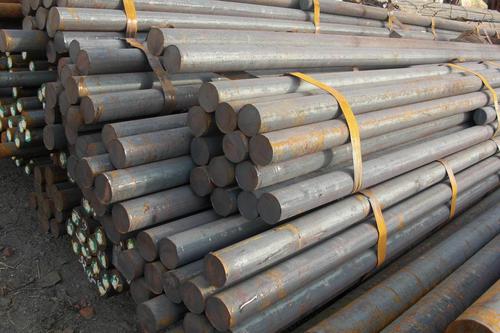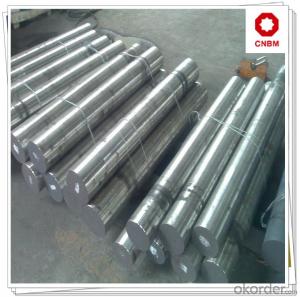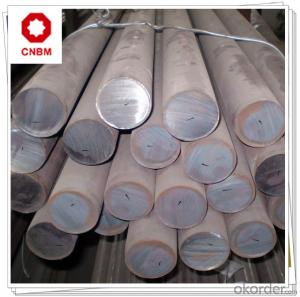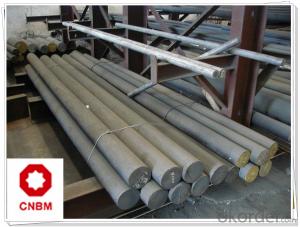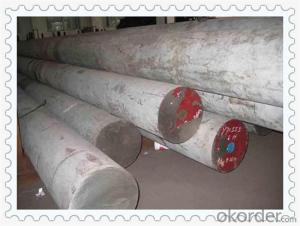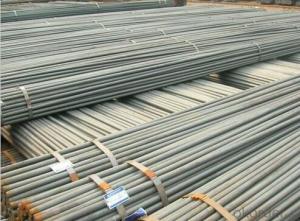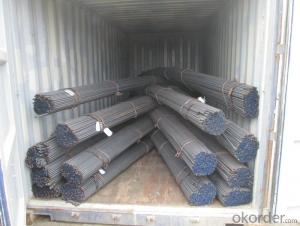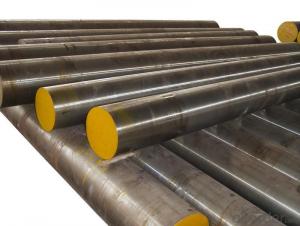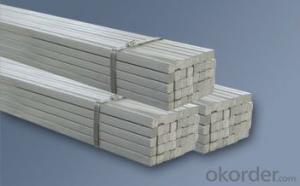Q345 Steel Round Bar
- Loading Port:
- China Main Port
- Payment Terms:
- TT OR LC
- Min Order Qty:
- -
- Supply Capability:
- -
OKorder Service Pledge
OKorder Financial Service
You Might Also Like
Specifications of Steel Round Bar:
1. Standard: GB
2. Grade: Q345
3. Invoicing on theoretical weight or actual weight as customer’s request
4. Shape: Round bar, solid bar of steel with circular section
5. Technique: Hot rolled
Size:
| Size (mm) | Section Area (cm2) | Mass (Kg/m) |
| 50 | 1962.5 | 15.4 |
| 80 | 5024 | 39.5 |
| 100 | 7850 | 61.7 |
Packaging & Delivery of Steel Round Bar:
Packaging Detail: Standard seaworthy packing or as customer required; all goods are packed in bundle with steel strips and shipped by break bulk vessel or container
Delivery Detail: 45 days
Trade terms: FOB, CFR, CIF or as customer required
MOQ: 25 tons per specification; we can negotiate the quantity if the specification is normal or we have stock of one specification.
Weight: The price invoicing on theoretical weight basis or actual weight basis depends on customer’s request.
Shipment: The shipment of bulk break or container is depends on customer’s request.
Documents given: Full set (3/3) of original clean on board bill of lading; Original signed commercial invoice, in 3 originals and 3 copies; Original packing list in 3 originals and 3 copies; Policy of insurance; Certificate of origin and what the target market needs.
* If you would like to get our price, please inform us the size, standard/material and quantity. Thank you very much for your attention.
- Q: What are the quality control measures for steel round bars?
- The quality control measures for steel round bars typically include visual inspection, dimensional checks, chemical composition analysis, mechanical testing, and surface finish evaluation. These measures help ensure that the round bars meet the required specifications and standards, guaranteeing their strength, durability, and overall quality.
- Q: How are steel round bars used in the manufacturing of material handling equipment?
- Steel round bars are commonly used in the manufacturing of material handling equipment to provide strength, durability, and stability. These bars are often used as structural components in the construction of frames, supports, and lifting mechanisms. They can also be machined or shaped into shafts, axles, or rollers, allowing for smooth and efficient movement of materials. Overall, steel round bars play a crucial role in enhancing the performance and reliability of material handling equipment.
- Q: Can steel round bars be used for pump shaft applications?
- Yes, steel round bars can be used for pump shaft applications. Steel round bars are often chosen for pump shafts due to their high strength, durability, and resistance to corrosion. Additionally, steel round bars can be easily machined and provide excellent surface finish, making them suitable for various pump shaft applications.
- Q: What is the minimum yield strength of steel round bars?
- The specific grade and type of steel being used can cause the minimum yield strength of steel round bars to vary. However, the majority of steel round bars generally possess a minimum yield strength of 36,000 psi (pounds per square inch) or 250 megapascals (MPa). This minimum yield strength ensures that the steel round bars are strong enough to resist applied loads and avoid deformation or failure. It is worth mentioning that certain applications may demand steel round bars with higher yield strengths to fulfill particular performance criteria.
- Q: What are the typical tolerances for steel round bars?
- The specific requirements of the application or industry can cause variations in the typical tolerances for steel round bars. However, common standard tolerances are generally accepted. Regarding diameter, the tolerances for steel round bars typically fall within a few thousandths of an inch. This means that the actual diameter of the bar may slightly deviate from the specified diameter, but it will still be within an acceptable range. In terms of straightness, steel round bars are commonly manufactured with a tolerance for some deviation from a perfectly straight line. The usual tolerance for straightness is measured in units of inches per foot or millimeters per meter. This means that the bar may have a slight bend or curve, but it should not exceed the specified tolerance. Surface finish is another important factor for steel round bars. The tolerance for surface finish is usually specified in terms of roughness average (Ra) or surface roughness in micrometers. This tolerance ensures that the bar's surface is smooth and free from significant imperfections, such as pits or scratches. It is important to note that these typical tolerances can vary depending on the specific grade or type of steel used, as well as the intended application. Precision or critical applications may require tighter tolerances, while less demanding applications may accept looser tolerances. Therefore, it is recommended to consult relevant industry standards or specifications to determine the specific tolerances required for a particular steel round bar.
- Q: What is the yield strength of a steel round bar?
- The yield strength of a steel round bar refers to the amount of stress or force that the bar can withstand before it starts to deform or permanently change shape. This is an important property to consider when designing or selecting materials for structural applications. The yield strength of a steel round bar can vary depending on the specific grade or type of steel being used. Common grades of steel such as A36, 1018, and 4140 typically have yield strengths ranging from 36,000 psi (pounds per square inch) to 100,000 psi. However, it is important to note that the yield strength can also be influenced by factors such as heat treatment, manufacturing processes, and the presence of any alloying elements in the steel composition. Therefore, it is always recommended to consult the specific material specifications or conduct proper testing to determine the exact yield strength of a steel round bar in a given application.
- Q: Can steel round bars be used in the automotive industry?
- Yes, steel round bars can be used in the automotive industry. Steel round bars are commonly used to make various automotive components such as axles, crankshafts, and suspension parts due to their high strength, durability, and ability to withstand heavy loads.
- Q: Are steel round bars resistant to fire?
- With their high resistance to fire, steel round bars exhibit exceptional fire-resistant properties owing to their high melting point and low thermal conductivity. In the occurrence of a fire, steel round bars do not readily ignite or combust. Moreover, steel maintains its structural integrity even under extreme temperatures, rendering it a favored selection for construction materials in areas susceptible to fires. As a result, steel round bars prove to be a dependable and secure choice for a range of applications, encompassing building structures, industrial equipment, and fire-resistant barriers.
- Q: What are the different types of steel round bar alloys for improved toughness and wear resistance?
- Improved toughness and wear resistance are key characteristics in several steel round bar alloys. These alloys are essential in applications where strength and durability are necessary. Some of the commonly utilized alloys are: 1. Alloy Steel: By incorporating elements like chromium, nickel, molybdenum, or vanadium, alloy steel round bars are fabricated to enhance their mechanical properties. These alloys provide increased strength, toughness, and wear resistance. 2. Stainless Steel: With a minimum chromium content of 10.5%, stainless steel round bars are corrosion-resistant alloys. They exhibit excellent toughness, high strength, and superior wear resistance. Industries such as aerospace, automotive, and construction widely rely on stainless steel round bars. 3. Tool Steel: Tool steel round bars are tailor-made for applications that demand high wear resistance and toughness. These alloys are commonly employed in the manufacturing of cutting tools, dies, and molds. By incorporating elements like tungsten, vanadium, or molybdenum, tool steel alloys improve hardness and wear resistance. 4. Carbon Steel: Renowned for their high strength and toughness, carbon steel round bars find extensive use. These alloys contain varying amounts of carbon and are recognized for their excellent wear resistance. Industries including manufacturing, construction, and automotive utilize carbon steel round bars. 5. Bearing Steel: Bearing steel round bars are specifically engineered to withstand high stress and offer excellent wear resistance. These alloys are commonly employed in the production of ball bearings, roller bearings, and other high-performance bearing components. Bearing steel alloys typically include elements like chromium, silicon, and manganese to enhance mechanical properties. To conclude, a range of steel round bar alloys is available, each offering improved toughness and wear resistance. The selection of the most suitable alloy depends on specific application requirements and desired mechanical properties.
- Q: What are the different surface treatments available for tool steel round bars?
- Tool steel round bars can be enhanced in performance, durability, and overall quality through various surface treatments. Some common treatments include: 1. Nitriding: Exposing the tool steel to a nitrogen-rich environment at high temperatures forms a hard surface layer, improving wear resistance and reducing friction. 2. Coating: Coating the tool steel round bars with materials like titanium nitride (TiN), titanium carbonitride (TiCN), or chromium nitride (CrN) provides excellent wear, corrosion, and heat resistance. 3. Black oxide: A chemical treatment that forms a black oxide layer on the surface of the tool steel, improving corrosion resistance and reducing the risk of rusting. 4. Heat treatment: Heat treatment processes like annealing, tempering, or quenching can be applied to tool steel round bars to enhance hardness, strength, and toughness. 5. Surface grinding: By removing a thin layer of material from the tool steel's surface, surface grinding achieves a smooth and polished finish, enhancing aesthetics and reducing surface defects. 6. Shot peening: Propelling small metal or ceramic particles onto the tool steel surface at high velocity induces compressive stress, improving fatigue resistance and extending lifespan. 7. Electropolishing: Immersing the tool steel in an electrolyte bath and applying an electric current, electropolishing removes surface imperfections, enhances surface finish, and improves corrosion resistance. Choosing the appropriate surface treatment depends on the specific requirements and applications of tool steel round bars. Each treatment offers unique benefits, significantly enhancing performance and longevity.
Send your message to us
Q345 Steel Round Bar
- Loading Port:
- China Main Port
- Payment Terms:
- TT OR LC
- Min Order Qty:
- -
- Supply Capability:
- -
OKorder Service Pledge
OKorder Financial Service
Similar products
Hot products
Hot Searches
Related keywords



